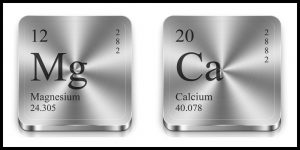And what are the other functions of this mineral in your body?
Osteoporosis or bone decalcification is a dormant disease. Without noticing anything, you can lose 30 percent of your body mass when you are older. The fact that your bones become thinner and more porous you will only notice when you break a bone. A small slip of a sidewalk can already be sufficient to cause a fracture of your wrist, hip or spine. It is therefore important to take over 40 additional measures to strengthen the bone tissue, which is even useful at the age of 70 or 80 years. Calcium appears to be very important for the prevention of osteoporosis. However, the mineral magnesium plays an equally important role in this process.
What is magnesium?
This mineral is named after the Greek city of Magnesia. Not without reason, what the soil around this city is particularly rich in Magnesium. This is an essential mineral for your health.
After all, you need this mineral to stay alive. Your body contains about 20 to 30 grams of magnesium. The vast majority of it – 60 percent – is found in your bones. The rest is found in the blood, body fluid, heart and muscles. The fact that magnesium is so important for the proper functioning of your body is apparent from the fact that this mineral drives more than 300 enzymes. These are special proteins that ensure that all kinds of processes in your body are well-functioning. These include thinking about the extrication of energy from nutrition, the smooth functioning of the muscles, increased stress resistance and strengthening of concentration and memory.
What is the role of Magnesium in your bones?
Magnesium is important for building the bones and maintaining a solid skeleton. It has now been established that women suffering from osteoporosis have less magnesium in the bones than healthy women. This is easy to explain. Magnesium converts vitamin D into an active form that is required for a good absorption of calcium in the bones. In addition, this mineral activates the enzyme alkaline phosphatase. This protein supports the formation of new calcium crystals in the bone tissue. But there is another reason to include magnesium in addition to calcium for the maintenance of strong bones. When calcium is taken only, the body signals a surplus of this mineral. Subsequently, calcium is withdrawn from the bones, causing them to become weaker. This process can be avoided by always taking calcium in combination with magnesium.
Magnesium helps with muscle cramps and restless legs
Painful muscular cramps: everybody is sometimes suffering from it. As much as 40 percent of the Dutch people suffer from it at night. Then the problems arise especially in muscles of the legs, calves and feet. According to research agency GfK, 168,000 Dutch people suffer from nightly cramps and almost one million every night. Seven times more women than men face this problem.
The muscle fibers of a particular muscle group are never all active at the same time. This is neatly interchanged. One part pulls together, while the other part takes rest. Being active and resting is being regulated. Muscle cramps arise when the fibers of one particular muscle group suddenly contract simultaneously. In many cases, magnesium can help reduce the symptoms because it has a relaxing effect on the muscles.
What is the role of magnesium in the muscles?
Magnesium is always found in the body together with calcium, also in the muscle tissue. There they act as each other’s opposites. These minerals counteract each other in order to maintain the muscle balance well. This means that groups of muscle fibers rest while other groups are contracting. Magnesium is the relaxing component in the muscle tissue and calcium controls the contracting of the muscle fibers. Modern food often contains little magnesium and a lot of calcium. There is a ‘lime surplus’ in the muscle tissue, which makes the fibers tend to contract. As a consequence, the functioning of the muscles may be disturbed and not only muscle spasms, but also other problems occur such as stiff muscles and restless legs. Therefore, it is important to use extra magnesium to prevent muscle cramps during day- and nighttime.
Magnesium helps with stress and tensions
Magnesium is also sometimes referred to as the ‘anti-stress mineral’. Those who suffer from stress situations consume more magnesium. When the stress persists, a shortage of this mineral can soon occur in your body. As a result, more adrenaline is released. This hormone narrows the blood vessels, increases blood pressure and makes the heart beat faster. The best remedy for restoring your body and mind is to replenish the lack of magnesium in your body. At stress, it is advisable to take magnesium before going to sleep. This mineral has a relaxing and relaxing effect on body and mind and supports the production of the melatonin sleep hormone. This ensures a good night’s sleep. In addition, magnesium enhances memory and concentration.
Magnesium gives more energy
Movement is very important for maintaining strong bones. By putting strain on bones, their structure and bone mass is improved and the process of bone depletion can be somewhat delayed. The energy to keep moving is also supplied by magnesium. This mineral sends the production into the energy plants of the cells (mitochondria) and helps to transport energy through your body. Fatigue can often be caused by a lack of magnesium in the body.
How much magnesium do I need daily?
The Recommended Daily Amount (ADH) of magnesium over the age of fifty years is 350 mg for men and 280 mg for women. Magnesium is mainly found in Parmesan cheese, halibut, mackerel, whole wheat products, nuts, green leafy vegetables, legumes, plums, cocoa and chives. Calcium is present in many more foods and also in higher doses.
Due to the impoverishment of agricultural land and food processing, our food contains less magnesium than before. In addition, only 30 percent of this mineral is taken from our diet. It is estimated that 60 percent of people have a shortage of this mineral in the body. This can lead to fatigue, muscle cramps, poor sleep, stress and osteoporosis. There are many magnesium supplements for sale to supplement shortages in the body. Look carefully at the label what kind of magnesium you buy. Magnesium oxide works laxative and magnesium carbonate is poorly absorbed. Preferably choose magnesium citrate. This form is very quickly and completely absorbed by the body.

Share this page
Tweet

Download for free the booklet ‘Moving without pain’ with a retail value of $6.75 / £4.95.
Any questions? Please feel free to contact us. Contact us.







